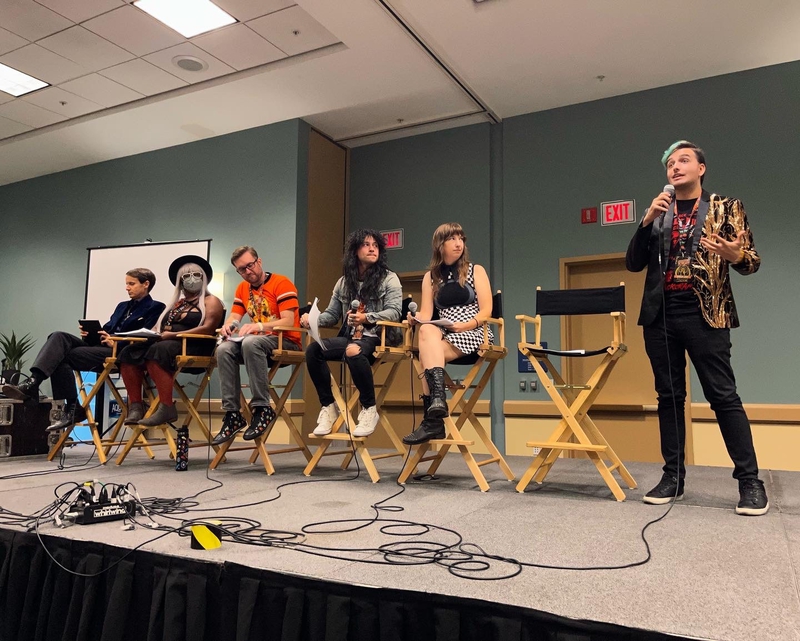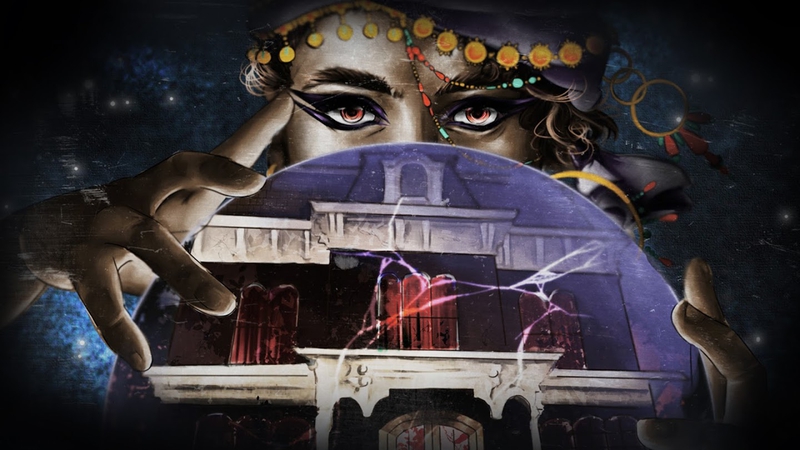"Radio Listeners in Panic, Taking War Drama as Fact" reads the immortalized front page spread of The New York Times on Halloween morning, 1938. In one chaotic night, an unfettered hysteria washed over the American public as Orson Welles' broadcast adaptation of The War of the Worlds raided airwaves to unprecedented effect. A seemingly harmless radio drama, bogged down by production turbulence, quickly turned into a history-making fluke of brilliance, preying upon the superstitions of the era, inciting widespread extraterrestrial panic, and forever changing the trajectory of audio storytelling. Nearly a century later, we're still hooked on the format, whether as a pledge to the phenomena of true crime podcasting, entertainment parley, or cast-recorded fiction, we all crave a good story as part of our daily auditory fix.
I am one such individual, caught in an endless cycle of consuming every bit of aural drama at my fingertips. I find solace in the innovative works put forth by my peers like Welcome to Night Vale or Big Finish's Dark Shadows, properties which inspired my foray into this fantastical realm as showrunner to the absurdist horror anthology It Listens From The Radio.

With traditional podcasting pulling in an estimated 424 million listeners worldwide and an average of eight shows per week for most listeners in 2022, as referenced by Forbes, it is safe to assert audio as the medium of today, and why not? It is a space with ample claim on original content in an industry where existing IP is a wealth more coveted than gold. And yet, audio fiction remains a facet of the conversation, smack-dab on the cutting edge, waiting for the mainstream to grow fully hip to the cause. As a creator in this niche, that is what excites me the most. Whatever your taste, there is a property waiting to thrill and chill you, and with the podcast proliferation post-lockdown, it's becoming harder to keep track of up-and-coming titles. The lush aesthetic of Lovecraftian fright found in The Call of the Void offers listeners a rich world of macabre intrigue and muscular writing. Midnight Musicals composes a chilling compendium of campy, serious, and abstract tales but with a fun-loving musical twist.

Not your cup of tea? Perhaps the anthology-based terrors of Bleeders DIEgest will evoke those pop-colored, post-Creepshow, scares that you so crave. BBC4's The Lovecraft Investigations modernizes the robust portfolio of the famed author through the lens of a true crime podcast, illustrating a masterful blend of contemporary language, source material, and new-age format. Even a return to the productions of old, such as the Agnes Moorhead-led Sorry, Wrong Number stands the test of time as a brilliant use of audio that elevates the theatrical experience in an intimate and bitingly comedic way.
But what about this classic narrative vehicle has suddenly captured the attention of a new generation? "Audio storytelling, whether done on the radio decades ago or in a podcast format today, is truly the 'theater of the mind,' and its unique ability to access our imaginations is, I think, what makes it such an effective medium," says A. Brad Schwartz, author of Broadcast Hysteria: Orson Welles's War of the Worlds and the Art of Fake News. "The most successful horror and sci-fi stories tap into our collective fears and anxieties, and because audio storytelling requires you to imagine those horrors for yourself, it can result in a far more personally affecting experience." Schwartz highlights a core component to any successful production, but especially the provocative reception of Orson Welles' pivotal audio crucible — intimacy.
More than presenting listeners with a familiar (yet fictionalized) setup, like a nightly news bulletin, Welles' martian invasion caught on the air is told entirely through the singular view of an announcer witnessing terrible events. "Radio is enormously good at generating empathy," continues Schwartz. "When a narrator tells you a story in the first person as if it happened to them, listeners will identify very strongly with that character, much more as you do when reading a book than watching a film. Some of the most frightening radio dramas don't pretend to be fake news like War of the Worlds, but draw you in by making you identify with a character in a terrible situation."

Other creators in the space attribute the surge in cast-recorded fiction to both a cultural content exhaust and a desire for authenticity. "We've been overstimulated by so many new TV shows and Marvel movies and reboots and remakes that it felt good to go back to the basics." Says Ali Garfinkel, creator of the Kristen Bell-led murder mystery, Deadly Manners. "It's so accessible that it almost seems like a no-brainer to invest in, and I think creators who can't get their stories told through traditional mediums see audio fiction as a way to make it happen more so on their own terms." It's also worth noting that many fans and creators find their way to drama of this nature by way of horror, and the "punk rock" creative liberty that it provides.
"Horror and science fiction are genres that are not required to adhere to the reality of what we know, and because of that are essentially limitless," says filmmaker and Deadly Manners, Darkest Night, and It Listens From The Radio writer Michael Varrati. "That sense of possibility is attractive to creators because they can take that aspect of the fantastic and use it as a mechanism to speak to all sorts of issues, big and small. In that way, the audio format can push things even further – the story, the characters, and the circumstances are provided, but you create the visual in your mind. It's almost collaborative. The world I imagine when I listen to an audio show may be similar to yours, but it won't be the same. It becomes personal. That's a powerful connection to make with your audience, especially when you're presenting them with big ideas."

Though Welles' work may cast an intimidating shadow all these years later, it has not dissuaded a new generation of creatives from attempting to replicate that lighting in a bottle or, instead, innovate the standard. "Night Vale is the show we wanted to make, whether it became well-known or not." Says Welcome to Night Vale co-creator Jeffrey Cranor. "I strongly believe we'd still be making the show whether we had 400,000 downloads after 11 years or 400,000,000. That's only to say that I think creativity and authenticity in art are entirely about intent. Do I know where that line is drawn? Not really, but sometimes I can guess. Night Vale's success has allowed us to do things like write novels, attempt to make a television show adaptation, and tour our live performances all around the world. We did those things because we think they're fun, challenging, and authentic to Night Vale itself." Cranor's series, co-created with acclaimed author Joseph Fink, follows a twice-monthly community radio program in a bizarre desert town where every conspiracy theory is true, hosted by the iconic voice of Cecil Baldwin (Scream Queen, Gravity Falls).

The shadow-infested streets of New Orleans set the stage for the dramatically ethereal The Call of the Void, an audibly immersive property coming out of the covid-19 lockdown. "The Call of the Void is a message about hope and love." Says series creators Josie and Michael Herman. "It's a message that we needed to hear ourselves at the time, and it gave us a whole new confidence in our voice as creators." That essential confidence is something that many are discovering through the audio and podcasting format. Some for the first time ever and some for the first time in this specific territory. "Writing on Darkest Night was my first narrative audio experience, and while at first it seemed so limiting, it helped expand my arsenal of storytelling tactics." Says Ali Garfinkel. "The great thing about Deadly Manners and Darkest Night is we didn't necessarily reinvent the wheel, but we did ask how we could present classic concepts in new, engaging ways."
Michael Varrati adds, "There's a reason murder mysteries and anthology horror continue to appeal to audiences, but when you have to recontextualize not just the way you tell the story but also the means, it opens up new doors and ideas. Audiences are hungry for something new to get lost in, and if you create something with earnestness and excitement, the people who need it will find it. The idea of a large-scale radio drama in a post-YouTube era doesn't seem like it should work, but we made something we believed in and it did. I think it's a lesson in taking a chance, because good art and stories transcend medium."
All of these unique entries are well-defined, devilishly compelling, and wholly their own, pulling in sizable and deeply loyal audiences with each episode. A handful of properties in a budding niche, they stand as a testament to the sheer power of possibility and independent enterprise, badges of honor to any aspiring storyteller. The landscape has vastly changed over the last decade, from archived radio to comedy specials, mixed-medium programming, and audio blogs. Though the mainstream hasn't always had the most sustained history of audio storytelling, audio fiction is here, has been here, and shows no signs of slowing down. It is bold, it is shocking, it is multi-layered and ultimately worth a few hours of your listening time. Though I can only shine a light on the general scope of the conversation, I eagerly encourage listeners who are hungry for a good ghost story or campfire fright to tune in to as many auditory properties as possible. As we celebrate this remarkable return to a format infamously known to terrorize and entertain, I ask you all to stay curious, stay creative, and stay tuned.






